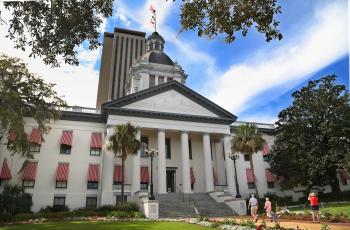Richard Doster
For the News-Leader

Hudson Taylor, a missionary to China in the mid-1800s, once said, “A little thing is a little thing, but faithfulness in a little thing is a great thing.”
Many of us, I suspect, can’t shake the feeling that we ought to do more for Christ’s kingdom. We give what we can, we participate in food drives and Christmas programs. We may volunteer for worthwhile causes. Still, it seems small. In one way or another, the words of the late John Haggai resonate with something inside us. “Attempt something so great for God, it’s doomed to failure unless God be in it.” Deep down, we’d love to do something memorable, something that will make a long-lasting difference.
But here we are, in a small town, on a small island, in a growing but not especially influential county — wondering, perhaps, if our lives will forever pale in comparison to Hudson Taylor’s and Billy Graham’s.
They probably won’t, because in God’s economy, it’s the faith behind the gift and the faith that motivates our efforts that matters most. When we look back, we see that Christ’s kingdom came into the world, and has grown throughout it, in small ways, through people and in places that seem ordinary.
That makes sense when we think about how one small thing leads to another, about how our acts of faithfulness are intertwined with those of others, and how the whole of what we do is compounded and pays dividends far greater than we’d ever expect.
Turn to Acts 10-11, to the story of Cornelius, a Roman centurion. An angel appears to him and has a detailed set of instructions for him. But first, the angel recounts how Cornelius’s prayers and financial gifts have ascended as an offering into heaven. Pause for a second and think about what that means. When we give to our church or to an organization whose work we admire, those gifts — given in faith and in the hope that God will make the most of them — are literally received by God himself. How, then, could they not make an extraordinary difference.
Think about the kid who gave Jesus his five loaves and two fish — a puny offering given the extraordinary need — one that couldn’t feed a large family much less a crowd of 5,000. Unless you put it in Christ’s hands, then, it will feed a multitude of any size.
In Luke 21, we find the story a desperately poor widow. She has practically no money and no visible support of any kind. Yet, she dutifully contributes a mite — a coin worth far less than today’s penny — because that’s all she has. In her own way, the widow understands how stewardship works. She sees that it begins by acknowledging that everything belongs to God, and that he expects us to think hard about how we use it. We ought to be thankful for the generosity of wealthy people, but we also need to know that in God’s economy, there’s nothing’s more powerful than a penny that’s been sacrificially given.
In God’s eyes, giving isn’t about the size of gift or the scope of the work; it’s in recognizing that everything we have — everything that exists — belongs to God. As the Apostle Paul wrote in Romans 11, “For from him, through him and to him are all things.” Nothing is really ours, including all the stuff we have in storage and in our retirement accounts. “No one can be my disciple,” Jesus said, “who does not first give up all of his possessions” (Luke 14:33).
Who knows what might happen if every Christian in Nassau County set out to do the small things God has set before them. David Cassidy, a pastor in South Florida, likes to say, “Great things happen when God’s people do the little things. The mite and the mission are never far apart.”
Such things are all around us; things that most any of us can do, things that will make an eternal difference to others and to us, as well. Take a small step to the little things and experience the joy that Christ will give you.
We may think that our gifts and talents don’t amount to much, but we’re wrong. In God’s hands, a mite still goes a long, long way. And God still chooses the weak to the confound the strong (1 Corinthians 1:27).
Remember the strange ways God works, Cassidy reminds us — a baby born in a manger, a basket with a couple of fish, the poverty of a crucified king … Then give what you can, do what you’re able, and leave the results to God.
Richard Doster lives in Fernandina Beach with his wife, Sally. He’s the editor of byFaith, the magazine of the Presbyterian Church in America, and can be reached at ddoster@icloud.com.


